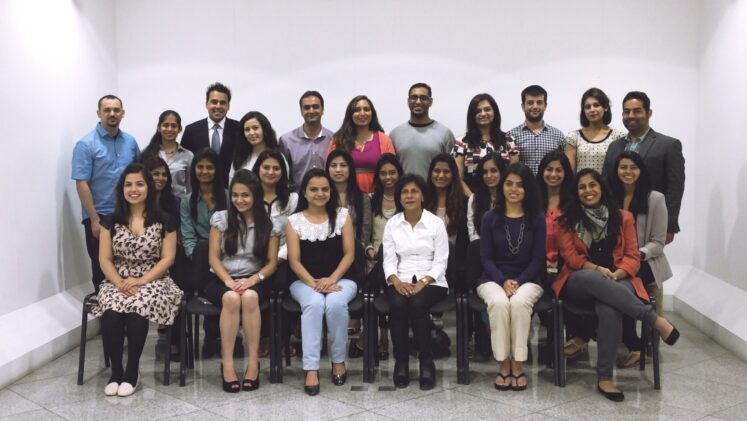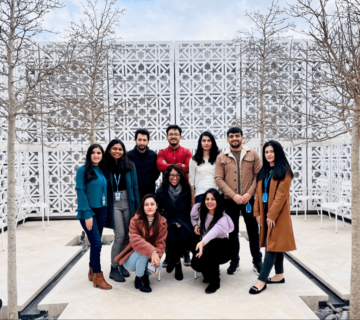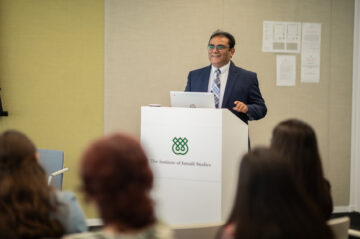The new students enrolled on the Graduate Programme in Islamic Studies and Humanities (GPISH) and the Secondary Teacher Education Programme (STEP) have arrived at the IIS and commenced their studies. These students were selected from a large pool of applicants and have been awarded scholarships to pursue postgraduate degrees, learning from some of the leading scholars in Ismaili and Shi‘i studies. Twelve students from Burundi, Canada, Pakistan, Syria, Tajikistan, USA and UK have commenced the GPISH programme and 28 students from Canada, India, Pakistan, Portugal, Tajikistan, USA and UK have been admitted to STEP.
STEP is a joint initiative between the IIS and the Institute of Education, University of London, to train teachers for the delivery of the Institute’s Secondary Curriculum for the religious education of Ismaili Muslim children. During the two-year programme, STEP students undertake courses at the University of London’s Institute of Education and the IIS. Upon completion of the programme, they will gain two postgraduate qualifications: a Masters in Teaching (MTeach) and a Masters in Education (Muslim Societies and Civilisations). Having qualified as secondary-level teachers, the graduates will take up teaching positions with the Ismaili Tariqah and Religious Education Boards in their home countries.
Discussing what she hopes to gain from the programme, Zakira Qaderi, who joins this year’s STEP cohort, from Montreal, Canada, said:
“I come from an Afghan background and grew up in Canada, which allowed me to experience the best of both worlds. My ability to speak different languages like Farsi, Pashto, Urdu, English and French has aided me in my interactions with our diverse Canadian community. One of the aims of the curriculum is to ensure that students have a positive sense of identity and to inspire in them self-confidence and self-worth. As religious educators, we hope to become role models for our students by incorporating the values and ethics of our faith in our teachings and in our daily lives. My aim is to help the youth of our community to overcome the challenges they face in their lives and to help them reach their potential through the curriculum.”
GPISH is a three-year graduate programme, the first two years of which act as preparation for a research degree and a stepping stone to a variety of career opportunities. Past graduates have pursued careers in a range of fields including media, academia, education and development. During the first two years at the IIS, GPISH students take a variety of courses in art, philosophy, religious studies, history and the social sciences. At the end of the first year, they have the opportunity to travel for an Arabic or Persian immersion programme to assist them in studying primary academic sources in these languages.
Nido Guljon, who joins this year’s GPISH cohort from Hissor, Tajikistan, said:
“I received a Diploma in Linguistics (majoring in English Language) in 1999. That same year I also completed the Professional Accounting School at the Education Centre of Khorog. After graduating with an MA in Bioethics in the USA, I decided to focus my study on religious ethics, and GPISH is a wonderful opportunity for me. This programme will enable me to look at Islam from an academic point of view, which in turn will help me to thoroughly understand and analyse it, without bias or cultural influence.”
GPISH students spend their third-year studying for a Masters degree in subjects resonating with the aims of the programme. Past graduates have pursued Masters Degrees at leading universities such as Oxford and Cambridge, the London School of Economics and Political Science (LSE), the School of Oriental and African Studies (SOAS), and the Institute of Education (IOE) at the University of London.
Dr. Laila Halani, Head of Graduate Studies at the IIS expressed her expectations and aspirations for the students in the following words:
“These forty students have embarked on an important and life changing journey and, in the years to come, they will hopefully bring about positive change within their own contexts and beyond. Whether they pursue a career in a diverse range of fields, as is the case with GPISH, or they become teachers and innovators in the field of education, the training they receive here will enable them to nurture the minds and souls of future generations.”
Further information, regarding both STEP and GPISH can be found on the Graduate Studies section of the website.







